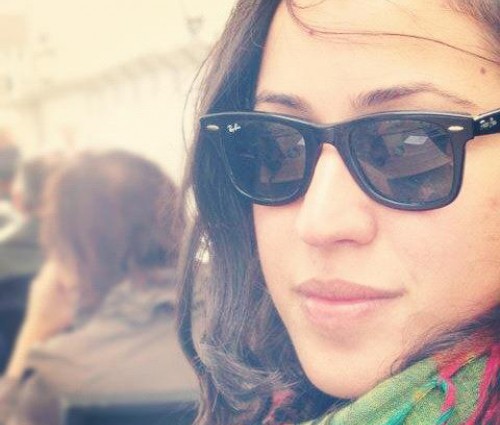Jehan Bseiso: Unsanctioned Writing from the Middle East
by Sampsonia Way / February 13, 2013 / 3 Comments
Nowhere Near a Damn Rainbow: Unsanctioned Writing from the Middle East
is an anthology of work from 31 poets who are part of the poetry collective
known as the Poeticians.
Sampsonia Way asked Hind Shoufani, founder of the Poeticians and curator of the book, to pick eight writers to be interviewed via email. In this series we present those poets’ voices and publish a poem from each.
The writer profiled in our second installment is Jehan Bseiso, a poet currently based in Brussels who grew up in Jordan, and allowed us to publish her poem “Conversations Continued/Splitends.”
Your poem “Conversations Continued/Splitends” is about the 60th anniversary of Nakba, or the “Day of Catastrophe.” For Palestinians, this day represents the tragic exodus from their homes in 1948. Why did you pick that topic?
So much has been written about the Nakba. In this short, manic piece I wanted daily life to be crushed by the weight of history. As I experience it, the Nakba anniversary, which takes place on the 15th of May, is an illustration of history’s burden on the individual’s memory, which is desperately seeking refuge in forgetting.
- Jehan Bseiso
- Jehan Bseiso is currently based in Brussels as a communication advisor for Doctors Without Borders, but she grew up in Jordan and studied in Lebanon. Her travels across the Middle East have also taken her to Afghanistan and Pakistan, among other places. Though born in Los Angeles, California, Bseiso is Palestinian. She began writing via short stories but eventually gravitated to poetry. As a self-described “compulsive eavesdropper” she’s fascinated by the poetics of everyday speech. Bseiso is currently working on a collection of poems entitled “Conversations Continued,” part of which has been published in The Palestine Chronicle, along with some of her other work.
How do you define yourself in terms of nationality?
My identity is hyphenated. I am an American born-Palestinian-Jordanian. I’ve tried simpler formulas, but could not get comfortable or feel complete making choices on who I am.
What is the importance of the Poeticians to you?
I first stumbled upon the Poeticians in a dimly lit cafe in Beirut. Up until then, I had loved literature and theatre separately as distinct entities—not realizing how everything comes together in performance poetry.
Nowhere Near A Damn Rainbow highlights that it’s an uncensored book of “unsanctioned” writing. How have you benefited from being in an uncensored collection?
Uncensored and unsanctioned, being published in Rainbow alongside the other writers has encouraged me to take my writing to the next level, beyond occasional catharsis.
Can you talk about freedom of speech in the Middle East?
Certainly there are more taboos in the Middle East than perhaps elsewhere, especially when it comes to politics and religion for example, but I would like to believe that this is slowly changing. I am more interested in self-censorship, in the walls we build with our own hands and the silences we create.
What misunderstandings does the West have about Middle Eastern literature?
Perhaps there is a misperception that Middle Eastern literature always has to be obviously political. In my experience, the political mixes with the personal almost at the cellular level; a poem can start with occupation and end in heartbreak.
What are you working on now?
I am working on a collection of poems titled, Conversations Continued. I think of it as a compilation of real, misheard, and misremembered conversations—always interrupted, never really complete or closed. I’m compelled by the architecture of daily speech and expression, by the pauses and utterances, by what we try to say and why we need to keep saying it.






3 Comments on "Jehan Bseiso: Unsanctioned Writing from the Middle East"
Trackbacks for this post